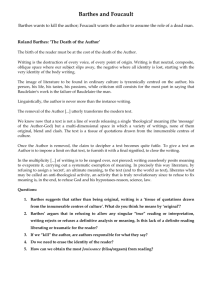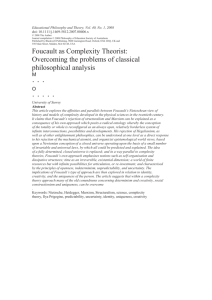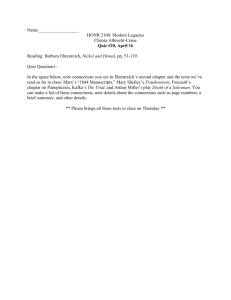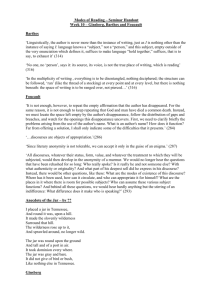Document 12727729
advertisement
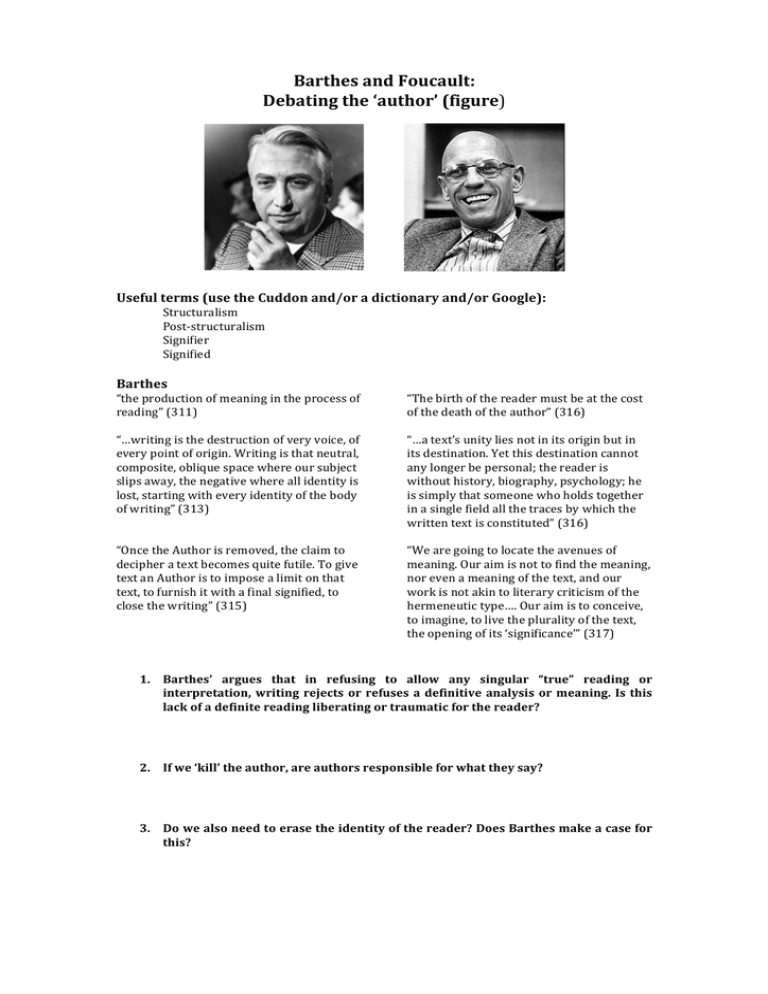
Barthes and Foucault: Debating the ‘author’ (figure) Useful terms (use the Cuddon and/or a dictionary and/or Google): Structuralism Post-­‐structuralism Signifier Signified Barthes “the production of meaning in the process of reading” (311) “…writing is the destruction of very voice, of every point of origin. Writing is that neutral, composite, oblique space where our subject slips away, the negative where all identity is lost, starting with every identity of the body of writing” (313) “Once the Author is removed, the claim to decipher a text becomes quite futile. To give text an Author is to impose a limit on that text, to furnish it with a final signified, to close the writing” (315) “The birth of the reader must be at the cost of the death of the author” (316) “…a text’s unity lies not in its origin but in its destination. Yet this destination cannot any longer be personal; the reader is without history, biography, psychology; he is simply that someone who holds together in a single field all the traces by which the written text is constituted” (316) “We are going to locate the avenues of meaning. Our aim is not to find the meaning, nor even a meaning of the text, and our work is not akin to literary criticism of the hermeneutic type…. Our aim is to conceive, to imagine, to live the plurality of the text, the opening of its ‘significance’” (317) 1. Barthes’ argues that in refusing to allow any singular “true” reading or interpretation, writing rejects or refuses a definitive analysis or meaning. Is this lack of a definite reading liberating or traumatic for the reader? 2. If we ‘kill’ the author, are authors responsible for what they say? 3. Do we also need to erase the identity of the reader? Does Barthes make a case for this? Foucault “The coming into being of the notion of ‘author’ constitutes the privileged moment of individualization in the history of ideas, knowledge, literature, philosophy , and the sciences” (281) – I think he’s being nice here: really, he means capitalism. ;-­‐) “I want to deal solely with the relationship between text and author and with the manner in which the text points to this figure that, at least in appearance, is outside it and antecedes it” (281) “In writing, the point is not to manifest or exalt the act of writing, nor is it to pin a subject within language; it is rather a question of creating a space into which the writing subject constantly disappears” (282) 1. Did you notice any similarities between the Shklovsky’s “Art as Technique” and Foucault’s “What is an Author”? (Hint: see p 282-­‐3). Foucault questions our tendency to view authorship as solid, and our habit of thinking about authors as individuals and heroic figures who somehow transcend or step outside history. 2. Why are we so strongly inclined to view authors in this way? Foucault asks us to think about the ways in which an author's name functions in our society. He argues that the names of authors often serve a classificatory function. Think about how the average bookshop is laid out. If you visited Waterstones looking for Harry Potter, you wouldn't search for books about magic, or books written post 1990, you would search for books written by Rowling. It probably wouldn't occur to you to search in any other way. 3. Why do we assume that it's ‘natural’ for Waterstones to classify books according to names of authors? What would happen to Harry Potter if we discovered it wasn’t written by Rowling? What happened when she wrote under a pseudonym? 4. If the author changed, most bookshops would feel the need to reclassify the book. Why should we feel that way? After all, the words of the novel wouldn't have changed. Author function: Note that the ‘author function’ is not a person and is not to be confused with either the ‘author’ or the ‘writer.’ The author function is more like a set of beliefs or assumptions governing the production, circulation, classification and consumption of texts. Foucault identifies and describes four characteristics of the ‘author function.’ 1. 2. 3. 4. The author function is linked to the legal system and arises as a result of the need to punish those responsible for transgressive statements (e.g. “obscene” writers). The author function does not affect all texts in the same way. For example, it doesn't seem to affect scientific texts as much as it affects literary texts. The editorial problem of attribution: the problem of deciding whether or not a given text should be attributed to a particular author. The term author doesn't refer purely and simply to a real individual. The "author" is much like the narrator, Foucault suggests, in that he or she can be an "alter ego" for the actual flesh-­‐and-­‐blood writer. Founders of discursivity: Writers like Marx or Freud who produce their own texts, plus ‘the possibilities or the rules for the formation of other texts.’ The author function has operated differently in different places and at different times, so shouldn’t we study this?
